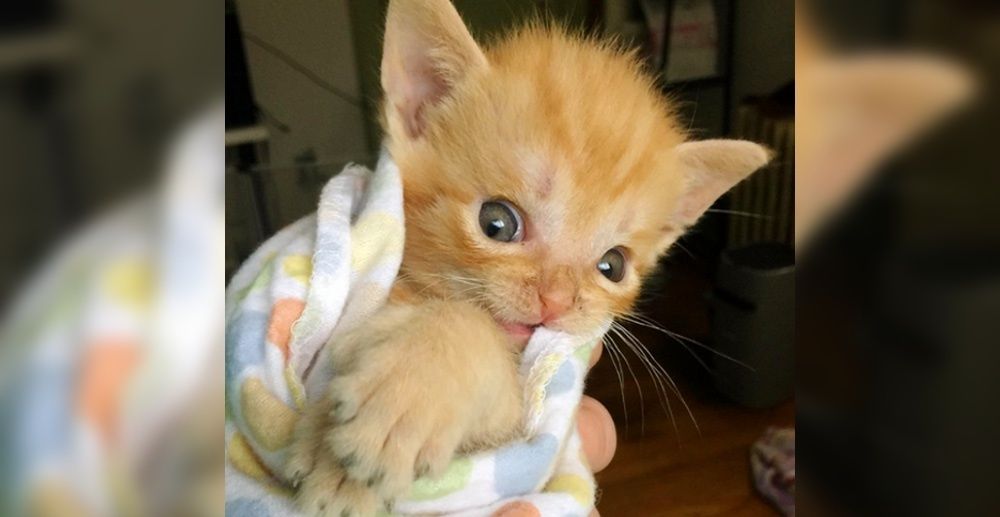Two months ago, a tiny 1-week-old kitten was found all by herself on the streets of Philadelphia and taken to the local city shelter where her fate became uncertain.
The little polydactyl was a bottle kitten. Due to limited resources, she was given a few hours to find a rescue to save her before it was too late. Jen Mack, founder of Kitkat Playroom (all-volunteer nonprofit rescue), learned about the kitten's plight and immediately rushed to the shelter.
"I drove to pick her up that day. It was rainy and overcast. As I was driving back with her next to me in the front seat, I looked over at this bright orange kitten, and started singing, 'I've got sunshine, on a cloudy day,'" Jen told Love Meow.
She named the kitten Tate and Tater Tot. At a young age, the tiny ginger already showed that she is a fighter.
"She was a voracious eater. She took to the bottle immediately and started gaining weight quickly."
When the kitten reached three weeks, Jen noticed a large soft spot on the top of her head. After a wellness exam, they decided that the kitten needed to see a specialist.
"We made an appointment with a highly recommended vet neurologist, Dr Glass at Red Bank Veterinary Hospital. Tate had an ultrasound and it confirmed that she had hydrocephalus (the buildup of fluid in the brain)," Jen told Love Meow.
Before the next follow-up visit, Tate was taken to an emergency visit due to excess fluid that needed to be drained. She recovered quickly and went right back to bouncing around the room, playing with everything she could lay her paws on.
"She's earned the nickname Tigger Tot because she jumps, zooms, and basically is out of control on energy level. She's full of beans," Jen said.
"The first thing she does when she gets back from her hospital stays is eat a ton. Most kittens get sleepy after they eat, but she gets amped up."
About two weeks later, she had another episode and needed a second emergency drain procedure. "At this point, Dr. Glass decided it was time to risk something that'd never been done on a kitten this small — it was time to place a shunt."
Having a magnetic shunt inserted will help drain excess fluid without surgery in the future.
Tate doesn't think she's any different. Her incredible resilience keeps her going no matter what challenges are thrown her way.
Last Friday, the magnetic adjustable shunt was placed in, and the operation was a success.
"As she grows, the amount of fluid that the shunt drains is changed externally by magnets and doesn't require surgery. It is the type of shunt that is placed in human babies," Jen told Love Meow.
Tate was the smallest kitty (less than two pounds) that Dr. Glass had operated on, but she had the most fight they had seen in a kitten.
Tate has been doing very well after her surgery. She is eating like a champ, using her litter box and wanting to play with everyone around her.
"She is always in a great mood and has no idea there's something different about her," Jen said. "She wants to bounce and play and will lay on her back and happily play with her feet even."
"She's only nine weeks old now, has been through two brain procedures and one serious brain operation that's never been performed on a kitten as small as she is," Jen told Love Meow.
"Tate is dynamite! She's unstoppable!"
Follow updates on Tate on Facebook and Instagram. Watch her live on YouTube.
Watch Tater's Guide to a Happy Life:
Share this story with your friends.
Related story: Woman Rescues Kitten Born Special While Others Decided to Give Up
